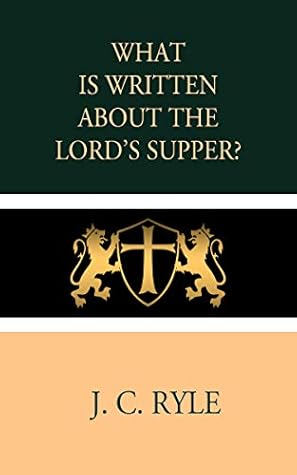- Bible
- Read the Bible
- Bible Versions
- Verse of the Day
- Reading Plans
- Verses by Topic
- Books of the Bible
- Bible Images
- Study
- Commentaries
- Concordances
- Dictionaries
- Encyclopedias
- Sermons
- Bible Atlas & Maps
- BP Wiki
- Devotionals
- Today's Devotionals
- Light of the World
- All Devotionals
- Inspirational Quotes
- More
- Picture Quotes
- Videos
- Inspirational
- Bible Study
- What The Bible Says
- Bible Q&As
- Daily Bread
- Bible by Genre
- Bible Stories
- Random Bible Verse
- Community
- Store
What is Written about the Lord's Supper?
by J.C. Ryle
The words which form the title of this paper refer to the subject of vast importance. That subject is the Lord’s Supper.Perhaps no part of the Christian religion is so thoroughly misunderstood as the Lord’s Supper. On no point have there been so many disputes, strifes, and controversies for almost 1800 years. On no point have mistakes done so much harm. The very ordinance which was meant for our peace and profit has become the cause of discord and the occasion of sin. These things ought not to be!I make no excuse for including the Lord’s Supper among the leading points of “practical” Christianity. I firmly believe that ignorant views or false doctrine about this ordinance lie at the root of some of the present divisions of professing Christians. Some neglect it altogether; some completely misunderstand it; some exalt it to a position it was never meant to occupy, and turn it into an idol. If I can throw a little light on it, and clear up the doubts in some minds, I will feel very thankful. It is hopeless, I fear, to expect that the controversy about the Lord’s Supper will ever be finally closed until the Lord comes. But it is not too much to hope that the fog and mystery and obscurity with which it is surrounded in some minds, may be cleared away by plain Bible truth.
BUY NOW
Kindle Edition, 34 pages
Published February 20th 2019 by CrossReach Publications
© 2025 Bibleportal.com All rights reserved.

J.C. Ryle (1816 - 1900)
J.C. Ryle was a prolific writer, vigorous preacher, faithful pastor, husband of three wives, [widowed three times: Matilda died in 1847, Jessie died in 1860, Henrietta died in 1889] and the father to five children [1 with Matilta and 4 with Jessie]. He was thoroughly evangelical in his doctrine and uncompromising in his Biblical principles. In 1880, after 38 years in Pastoral ministry in rural England, at age 64, he became the first Anglican bishop of Liverpool. He retired in 1900 at age 83 and died later the same year at the age of 84.“He [J.C. Ryle] was great through the abounding grace of God. He was great in stature; great in mental power; great in spirituality; great as a preacher and expositor of God’s most holy Word; great in hospitality; great as a writer of Gospel tracts; great as a Bishop of the Reformed Evangelical Protestant Church in England, of which he was a noble defender; great as first Bishop of Liverpool. I am bold to say, that perhaps few men in the nineteenth century did as much for God, for truth, and for righteousness, among the English speaking race, and in the world, as our late Bishop.” - Rev. Richard Hobson, three days after Ryle’s burial in 1900.
John Charles Ryle was the first Anglican bishop of Liverpool. Ryle was a strong supporter of the evangelical school and a critic of Ritualism. Among his longer works are Christian Leaders of the Eighteenth Century (1869), Expository Thoughts on the Gospels (7 vols, 1856-69), Principles for Churchmen (1884).
Thoroughly evangelical in his doctrine and uncompromising in his principles, J.C. Ryle was a prolific writer, vigorous preacher, and faithful pastor.
In his diocese, he exercised a vigorous and straightforward preaching ministry, and was a faithful pastor to his clergy, exercising particular care over ordination retreats. He formed a clergy pension fund for his diocese and built over forty churches. Despite criticism, he put raising clergy salaries ahead of building a cathedral for his new diocese.
Ryle combined his commanding presence and vigorous advocacy of his principles with graciousness and warmth in his personal relations. Vast numbers of working men and women attended his special preaching meetings, and many became Christians.
John Charles Ryle was born at Macclesfield and was educated at Eton and at Christ Church, Oxford. He was a fine athlete who rowed and played Cricket for Oxford, where he took a first class degree in Greats and was offered a college fellowship (teaching position) which he declined. The son of a wealthy banker, he was destined for a career in politics before answering a call to ordained ministry.
He was spiritually awakened in 1838 while hearing Ephesians 2 read in church. He was ordained by Bishop Sumner at Winchester in 1842. After holding a curacy at Exbury in Hampshire, he became rector of St Thomas's, Winchester (1843), rector of Helmingham, Suffolk (1844), vicar of Stradbroke (1861), honorary canon of Norwich (1872), and dean of Salisbury (1880). In 1880, at age 64, he became the first bishop of Liverpool, at the recommendation of Prime Minister Benjamin Disraeli. He retired in 1900 at age 83 and died later the same year.
Ryle was a strong supporter of the evangelical school and a critic of Ritualism. Among his longer works are Christian Leaders of the Eighteenth Century (1869), Expository Thoughts on the Gospels (7 vols, 1856-69) and Principles for Churchmen (1884).
... Show more